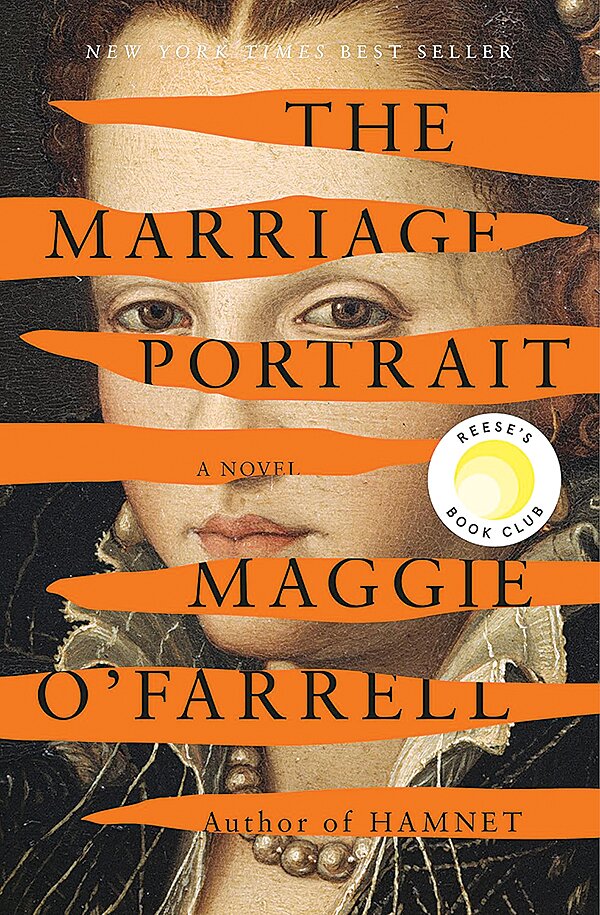This ‘Marriage Portrait’ is historical fiction at its best
One of the very best book I have read all year, “The Marriage Portrait,” is a superior work of historical fiction, riveting from the very first page. Based on the arranged marriage of 14-year-old Lucrezia de Medici, daughter of the wealthy Duke of Florence, to the powerful Alphonso, Duke of Ferrara, it is a mesmerizing tale of intrigue and machinations set in the 1550s.
This item is available in full to subscribers.
Please log in to continue |
Register to post eventsIf you'd like to post an event to our calendar, you can create a free account by clicking here. Note that free accounts do not have access to our subscriber-only content. |
Day pass subscribers
Are you a day pass subscriber who needs to log in? Click here to continue.
This ‘Marriage Portrait’ is historical fiction at its best
‘The Marriage Portrait’
By Maggie O’ Farrell
One of the very best book I have read all year, “The Marriage Portrait,” is a superior work of historical fiction, riveting from the very first page. Based on the arranged marriage of 14-year-old Lucrezia de Medici, daughter of the wealthy Duke of Florence, to the powerful Alphonso, Duke of Ferrara, it is a mesmerizing tale of intrigue and machinations set in the 1550s.
Alphonso was initially betrothed to Lucrezia’s older sister, but after her death, set his eyes on younger “Lucre” when just a child. While away at war for two years, he bid his time to settle a union that would be politically and financially advantageous to him.
A well-bred, well-educated and innocent girl, although with a fertile imagination, she was considered ideal for a wife who would be malleable to his control. We follow Lucre from her early childhood to her teen years, living in a cheerful and protected Renaissance palazzo with her parents and siblings.
Her circumstances change drastically upon her marriage, when she is coerced to leave her beloved home to relocate to the territory her husband rules. She could not possibly know the treachery and peril awaiting her there.
First, the innocent must bend to the will and desires of her husband, who exerts a compelling hold upon her, dictating her every move, her attire, her activities. Alone, but for her childhood maid, she becomes unmoored, not only from the absence of the family she loves and all that is familiar, but also from the demanding and critical man to whom she is married. Occurrences at the castle cause her extreme distress, from the brutal beating of a boy-page punished for merely dropping a box, to the expulsion of the Duke’s sister who has disobeyed his orders. The atmosphere of her new home is oppressive and chilling, pulsing with terror as she feels more and more a prisoner. Although the Duke makes her gifts, like a small donkey to ride around the palace grounds, he is an imposing figure of steely control and unreasonable demands.
Obsessed with capturing Lucrezia’s youthful beauty on canvas, Alphonso secures the very best artists to be had and arranges for her to pose for weeks before the master and his two apprentices, one mute, which becomes an important fact in the tale. The Duke chooses what she will wear, where she will stand, how she will be framed, intent on every detail. Here too, fear is the prevalent, as it is obvious the painters are anxious to please him and sense his testy temper.
After some time, Lucrezia becomes convinced that Alphonso is so displeased with the marriage, especially when she fails to become pregnant, that he intends her demise. She has learned through underlings that he is desperate for an heir so that his kingdom will be secure from the designs of his sisters and their progeny. So the coupling of husband and wife becomes all the more intense, causing the child-bride excruciating distress.
The tension mounts with every passing day as Lucrezia observes more and more harrowing occurrences within the palace walls which her husband refuses to acknowledge or discuss with her. She has no hope of escape, and the stress and pressure cause her to become ill. When a doctor is summoned, she suspects he may serve as a partner to her husband’s insidious desire to be rid of her.
O’Farrell’s writing is superb, even poetic at times in its vivid description of the Italian landscape, its gorgeous natural beauty, as well as the splendor of Renaissance architecture. All is sumptuous, from the deliciousness of the foods to the richness of the costumes. Reading the book is akin to viewing a riveting period drama, exquisitely plotted with searing and jarring moments. The reader’s interest never wanes and builds to a crescendo with a very surprising ending.
For this “electrifying” novel, Maggie O’Farrell was named winner of the National Book Critics Circle Award and won a Women’s Prize for Fiction. The honors are well-deserved. It might behoove the reader to read Robert Browning’s poem, “My Last Duchess,” upon which this novel is based. Its content has the Duke showing off the painting of his deceased wife to an emissary come to arrange his next marriage.
Browning utilizes the dramatic monologue technique, which is like listening to one end of a telephone conversation in which the Duke does all the talking, through which he reveals his acquisitive and arrogant personality, pointing to his “Last Duchess” as if she were a possession attesting to his power and affluence – a very telling poem.
“The Marriage Portrait” is historical fiction at its very best!
Donna Bruno is a prize-winning author and poet recently recognized with four awards by National League of American Pen Women.






